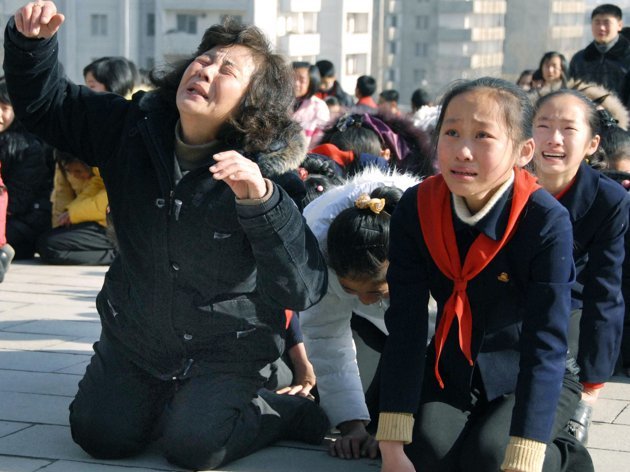
The death of Kim Jong Il likely puts the leadership of North Koreainto the hands of an even more mysterious man, his son, Kim Jong Un, fueling speculation about a struggle for power in the reclusive nation, and with that control of a nuclear arsenal and the world's fourth-largest military.
Former US Ambassador to South Korea Donald Gregg says he is more optimistic about the future of North Korea with the death of its "dear leader," because Kim Jong Un may be able to move the country more in line with the west.
"There has been a generational change in the top leadership. Some of the 70- and 80-year-olds, really hard-line people, have faded away," said Gregg.
Gregg says the change in leadership does not mean the country will flex its nuclear muscles, because Kim Jong Un will "need to provide stability in a changing time and that could mean no rash moves."
"This is potentially a very positive development because the upcoming year is a year of transition," Gregg said.
Mike Chinoy, a senior fellow at the US China Institute at the University of Southern California who has been to North Korea 15 times, agrees that chaos is not imminent.
"It is important not to rush to the conclusion that the death of Kim Jong-Il means the North Korean system is heading toward collapse. A succession has been in process. it is acknowledged and accepted by key players in the North Korea system," Chinoy said. "Moreover it's equally clear that China, for its own reasons, is not going to let North Korea go down and will do everything in its power to help North Korea and prop them up."
But not everyone is so optimistic. Republican Rep. Peter King, chairman of the House Homeland Security Committee, said "we shouldn't kid ourselves just because [Kim Jong Un is] new."
"Just because he's young, we have to assume he's going to be as bad and evil as his father was," King said. "...The question to me will be how strong the military is going to be, if the military is going to try to insert itself and even more than it has in the past."
North Korea is "basically an organized crime ring posing as a government," said King.
BBC's Michael Bristow in Beijing says China will do all it can to prop up the new young leader of its communist neighbor.
"China and North Korea share a very, very long border. And over the last decade or so their divergence in ideologies, in economies and wealth of these two countries have gotten even sharper. So any instability, any problems in North Korea could spill out over that border into Northeastern China. And that's one thing the Chinese government won't want to see," Bristow told ABC News.
Despite China's efforts, Chinoy thinks the US needs to stay on high alert.
"The fact is we have very bad relations with North Korea. China props North Korea up but North Korea is also a nuclear power so right now diplomacy is going to be important. I think we should stay on a high state of alert, certainly South Korea will," King told ABC News affiliate WABC.
Will the Death of Kim Jong Il Improve North Korea's Relationship With the U.S.?
The death of Kim Jong Il and the uncertain path of the North Korean government could give the U.S. a chance to improve relations with North Korea.
"The time can be used by sort of track two diplomacy to set the stage for more positive developments, in terms of dialogue, among the six party talks, perhaps at the end of next year," Gregg said.
"The North Koreans in recent months have been signaling very clearly that they would like to engage diplomatically with the United States. It's been the Obama administration that has been holding the North Koreans at arm's length, pushing for the North Koreans to meet certain conditions before Washington agrees to go back to the six party talks. So partly at this point the ball's in Washington's court," said Chinoy.
When Kim's father died in 1994, President Bill Clinton and the United States expressed their condolences.
"…that helped lay the groundwork for an agreement to curtail North Korea's nuclear program that was signed in October of 1994. So I think a lot depends on how the Obama administration handles this and what kind of signals it sends to the North Koreans. That will determine I think to a significant degree how the North Koreans behave," said Chinoy.
The U.S. has 28,000 troops stationed on the border, so we are involved, whether the Obama administration wants to be or not.
Will the North Korean People Revolt?
With last year's Arab Spring inspiring uprisings across North Africa, the Middle East and most recently Russia, many hope the North Korean people will take Kim Jong Il's death as an opportunity to demand a change in the communist system.
But Mike Chinoy believes a North Korean version of an "Arab Spring" is highly unlikely.
"The notion that somehow North Korea is going to have its version of an Arab Spring I think is very, very far-fetched. For one thing, the apparatus of control by the state is overwhelming and there's very little mobility, there's very little internal communication," said Chinoy.
"People go to jail at the slightest hint of dissent. And within the capital city of Pyongyang, which is the politically most important place, there have been some signs of incremental economic improvement. So I don't think you're going to see any protests there. And hungry people are worried about where their next meal is coming from. They're not really in a position to go out in the streets and protest," Chinoy added. VIDEO


